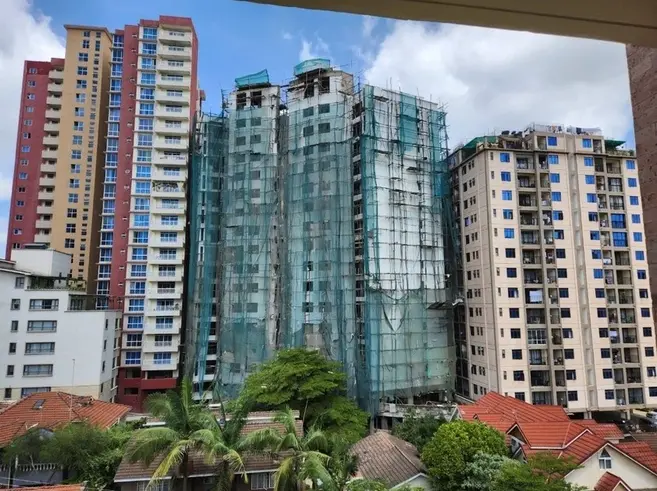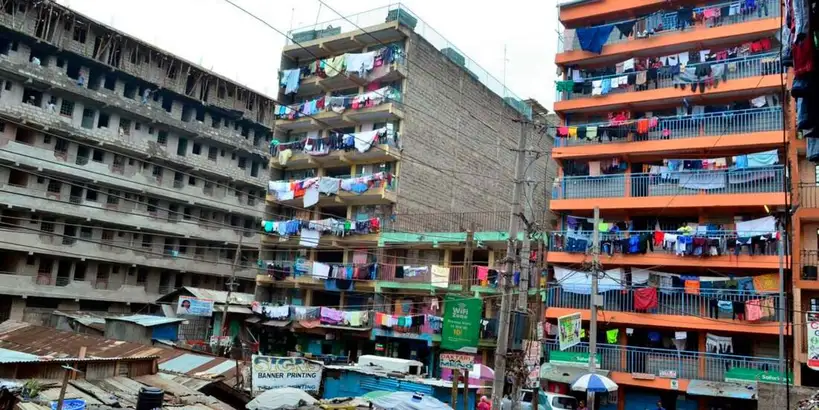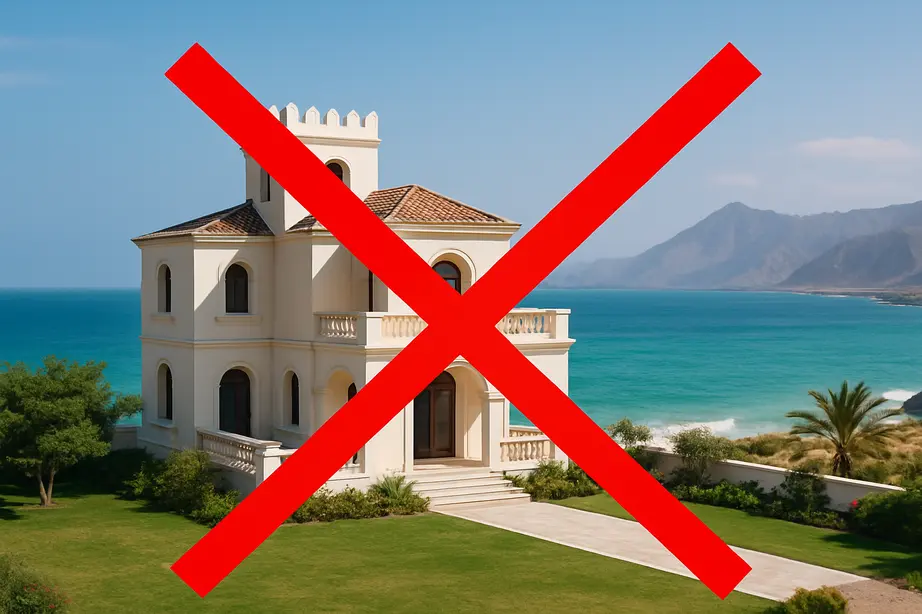In my previous post, I shared why I believe Nairobi is a prime investment market. But before you jump in, here are the key risks you should consider.
Bonus Insight
I spoke with two seasoned real estate investors who were also interested in Nairobi. Listen to what they had to say about the risks and their final decision at the end of this post. The reason might surprise you!
1. Oversupply Risk
At first, the surge of Chinese investment in Nairobi seemed like a strong vote of confidence (read more on this in my previous blog). However, their rapid, unchecked development could lead to oversupply—especially in the luxury condo segment, where demand may not keep pace with new units.
I’ve seen this before. China itself has ghost cities, and the same overbuilding issues have surfaced in Malaysia and Cambodia, where large-scale Chinese-led developments were left unfinished or under-occupied. From my conversations with Chinese developers, the pattern is clear: they continuously build one project after another, often in parallel, without fully assessing demand
📌 What this means for investors:
- Luxury property values could decline due to oversupply.
- Rental yields may suffer in overbuilt areas.
✅ My hope: The Kenyan government should regulate urban expansion to prevent overdevelopment before it’s too late.
2. Unfinished Buildings & Construction Quality Issues
If you’ve invested in frontier markets like Vietnam, Indonesia, and Cambodia, you know that unfinished projects, delays, and poor construction quality are common risks. Kenya is NOT an exception.
A recent report highlighted that at least 400 development projects across 14 state departments, valued at approximately KSh 662.9 billion, have stalled. In Nairobi County, 48% of construction projects remain incomplete, with 10% of these projects having completely stalled (2023)
📌 What this means for investors:
- Financial Losses: Investing in incomplete projects can tie up capital without returns.
- Quality Concerns: Hastened completions may compromise construction standards.
✅ Actionable items to do before investing in a project:
- Investigate developer track records before buying.
- Visit completed projects and talk to tenants.
• Check for online reviews and legal assurances before committing
3. Serious Water Shortages—A Citywide Crisis 💧
Nairobi’s water supply falls 325 million liters short daily, making water scarcity a major infrastructure challenge.
Key Facts:
- 850 million liters needed daily, but supply is just 525 million liters.
- Many households receive water only a few days a week.
- Developers rely on boreholes and massive storage tanks to ensure a steady supply.
📌 What this means for investors:
- Operational costs increase as landlords may need to provide water storage solutions.
- Tenant satisfaction drops if water shortages persist.
4. Drainage & Flood Risks 🌧️
Nairobi’s drainage system struggles to handle heavy rainfall, making flooding a real risk—especially for ground-floor units.
High-Risk Flood Zones:
- South C
- Nairobi West
- Parts of Eastlands
Even in relatively upscale areas like Westlands and Kilimani, where drainage systems are slightly better, flooding is still a risk that investors need to consider.
📌 What this means for investors:
- Flood-prone properties require extra maintenance.
- Higher insurance costs may apply.
- Consider upper-floor units in high-risk zones, or avoid high-risk zones at all costs.
5. Kenya’s Rising Debt
Kenya’s Debt-to-GDP ratio is ~70%, significantly above the recommended 50% for developing economies. This rising debt could have serious economic consequences:
Potential Impact:
- Higher taxes to cover debt repayments, impacting businesses and consumers.
- Budget cuts in infrastructure and services, affecting real estate demand.
- Weaker currency due to lower investor confidence.
📌 Impact on Real Estate Investors:
- Slower infrastructure development could limit growth in emerging areas.
- Market stagnation may reduce rental demand and property appreciation
6. Currency Devaluation
The Kenyan Shilling (KSh) has lost 50% of its value in a decade:
Exchange Rate Trends:
- 2010: 1 USD ≈ KSh 80
- Today: 1 USD ≈ KSh 160+
For investors earning rental income in KSh, this devaluation could mean lower returns when converting to stronger currencies like USD or EUR.
📌 My Perspective:
- Having dealt with a weak Vietnamese Dong (VND) most of my life, I understand currency volatility.
- A weaker KSh could be an opportunity—foreign investors can acquire discounted assets and benefit from future appreciation.
In fact, this is why I’ve already purchased two apartments and invested in two companies in Kenya. I see the weaker KSh as a potential opportunity to acquire assets at a discounted price while still positioning myself for future growth.
Two Seasoned Real Estate Investors’ Perspectives on Nairobi
Background
- Both have made millions investing in real estate, primarily in The Netherlands.
- 10+ years of experience in the industry.
- First-time investors outside of their home market(s).
- Married with kid(s)
Investor A – Still Investing
- Bought 2 luxury apartments in Westlands (one in the same project as mine).
- Plans to invest more if she finds good opportunities.
- Aware of the risks but comfortable with them.
- Goal: Diversify capital concentration in case of market instability in Europe (Read more in another blog on why diversifying your real estate investments is crucial.)
- Lifestyle: Loves travel and adventure—sees Nairobi as one of her possible future retirement options
Investor B – Pulled Out
- Initially planned to buy land and build a hotel in Nairobi
- Changed focus and considered buying 2 luxury apartments in Westlands, but also pulled out at the end.
- Goal: Diversify capital concentration but prefers Netherlands & home country where she has complete control over and can directly manage the properties
- Reasons for pulling out:
- Doesn’t see herself coming to Nairobi often to oversee the property.
- Doesn’t want to rely on a property manager, as it could lower rental yields.
My Takeaway
I completely understand Investor B’s concerns. Actually, both Investor A & B are excellent landlords who enjoy the responsibilities that come with it. Thanks to their hands-on approach, they have achieved spectacular rental yields and grown their portfolios tenfold.
But here’s something I’ve never explicitly shared in any of my previous blogs, and perhaps it may help other investors still figuring out their path—I love investing in real estate, but I HATE being a landlord.
Early on in life, I learned a crucial lesson: If I don’t enjoy doing something, I can delegate it to people who do—and pay them well for their expertise. This mindset has been the driving force behind not only my real estate investments but also the seven companies I’ve built from the ground up.
Would you believe I don’t even know how to use basic Excel or accounting? Yet, I’ve built successful businesses because I hired people who are great at the things I’m bad at.
Sure, you might run into a bad property manager—so what? You fire them and hire a better one. Yes, it will cost more and slightly lower rental yields, but it also eliminates stress and frees me to focus on what I actually enjoy—investing, growing businesses, and living life on my terms. WIN-WIN 🏆!
At the end of the day, investing is about making choices that align with your lifestyle, goals, and risk tolerance. Whether you’re a hands-on landlord or a delegator like me, the key is to build a strategy that works for you.
Final Thoughts—Why I’m Still Investing in Nairobi
Despite these risks, Nairobi’s growth trajectory remains strong. The economy is expanding, the population is increasing, and mid and upper-range housing demand is consistent.
✅ Would I invest again? Absolutely—but with a refined strategy:
- Buy an entire floor (10-24 apartments) in a mid-market development (aiming for one of the highest floors)
- Why?
- Strong negotiation power for bulk purchases.
- Lower renovation and maintenance costs.
- Full control over rental pricing with less competition.
Happy investing! 🚀💰
Need Expert Help?
If you’re serious about investing in Nairobi and need recommendations for a reliable lawyer or a trusted real estate expert, feel free to reach out. I’m happy to share my trusted contacts to help you navigate this market smoothly.
Oh, I Forgot to Mention…🙊
Real estate isn’t the only way to invest in Kenya. In my next blog, I’ll share how I invested in TWO profitable Nairobi businesses with less than $50K—and why Kenya is a hidden gem for investors beyond real estate. If you’re looking for alternative investment opportunities with high returns and lower capital requirements, stay tuned! 🚀









